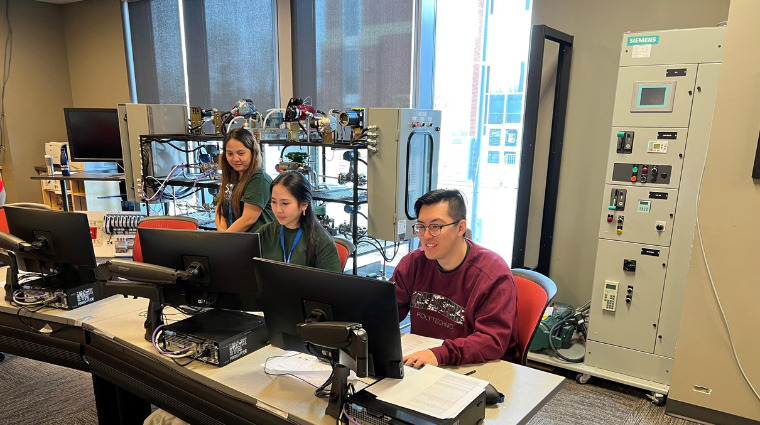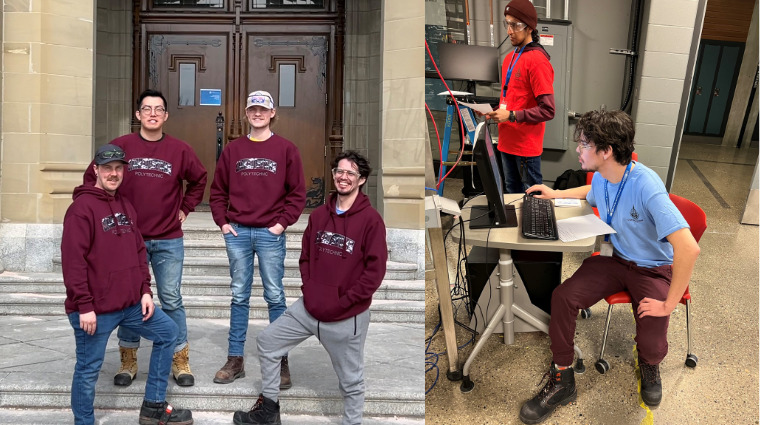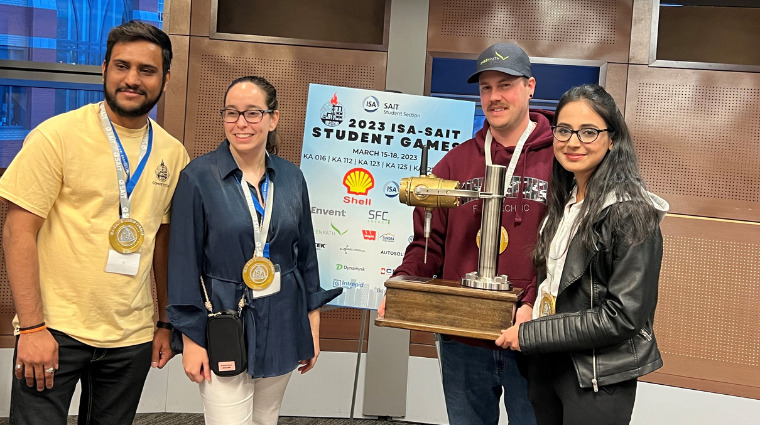
Four students from the Instrumentation Engineering Technology program at Saskatchewan Polytechnic’s Moose Jaw campus recently competed in the tenth annual International Society of Automation (ISA)-SAIT Student Games 2023. Held on the Southern Alberta Institute of Technology (SAIT) campus in Calgary, these are the largest student-led industrial automation games in the world. This year’s event took place in March and drew students from higher education institutions around the world.
The student games are planned, organized, led and executed by the ISA-SAIT student board of directors with the help of volunteers and support from instrumentation companies. In an unusual competition format aimed at levelling the playing field for competitors, visiting students from colleges, polytechnics and universities around the world are placed on teams comprised of three visiting students and one local second-year SAIT instrumentation student.
As well as SAIT and Sask Polytech, students came from institutions in Canada and around the world including BCIT, Francis Tuttle Technology Center, ISA District 12 (Spain/Ireland), ISA District 14 (India), Lambton College, McMaster University, Northern Alberta Institute of Technology (NAIT), Red River College, University of Alberta, University of Houston, and King Fahd University of Petroleum and Minerals.
Sask Polytech student Curtis Dammann, who originally hails from Weyburn, was on this year’s winning team, along with Riya Gautam of British Columbia Institute of Technology (BCIT), Gema Frutos Roldán of ISA Sección Española in Spain, and Dhairya Vyas of SAIT.
“It was quite an experience,” says Dammann, who will graduate this spring from the Instrumentation Engineering Technology program. “It was incredible to be part of such a big event. We arrived in Calgary on Wednesday and headed to Banff the next day where we were put into our teams. Friday and Saturday were our competition days. It was exciting.”
The other three Sask Polytech instrumentation students, Andrew Gardiner, Junmyeng Lee and Dylan Sack, also fared well on their mixed teams.
Jared Mathieson, the Sask Polytech instructor who led the team, notes that the mixed-institution team format allows students to focus on collaboration and knowledge sharing, rather than just competition between institutions. “All institutions and programs teach differently,” notes Mathieson, “and this format gives each student a chance to bring something different to the table. The ISA-SAIT Student Games are an excellent opportunity for students to collaborate with others from around the world and build connections. They walk away with three really good friends from their team, as well as other connections made at games events.”
Sack, who is also in his final semester before completing his program, agrees that the experience was all about learning to work as a team. “That’s what I got from it. Not everyone has the same way to solve a problem. We had to figure out what each of our strengths were and how we could use them to complete the challenges.”
During the games, teams work together to complete challenges where they are timed, tested and graded. These range from physical simulations, analyzer lab processes, device maintenance safety procedures, diagnostic and solutioning tasks and other trials that test their knowledge and abilities related to industrial automation. Daily lunch-and-learns and tours provide competitors the opportunity to network and share their diversity of experience within their field.
“There were six challenges in total,” explains Dammann, “and each team did four in random rotation. An example of one challenge was the analytical lab, where we had to take apart a gas analyser to find out what was wrong with it and fix it. That was timed, so we had pressure to make it work quickly.”
“The challenges were hard,” notes Sack. “My team was the first to get the process up and running in the distributed control systems test. That felt good.” Mathiesen notes that on all four teams, the Sask Polytech students seemed to be leaders. “I expect that’s partly because our students participate in co-op work terms. That gives them confidence and real-world experience in a team environment.”
“This was the tenth ISA-SAIT Student Games” says Mathiesen “and we’re proud to say Sask Polytech usually brings home a medal. This year we took a top place finish.”
“I was really surprised and happy to be part of the winning team,” says Dammann. “I’d tell other students to take this opportunity if it comes their way. I wasn’t going to go because our program is already busy but my classmate Dylan said ‘I’ll do it if you’ll do it.’ I’m sure glad we did!”
“It was a great experience to have,” agrees Sack. “Our instructors talk about the games throughout our program, and when Jared asked if I’d like to come I knew I wanted to take part.”
“Congratulations to our students on your success at this year’s ISA-SAIT Student Games,” says Dr. Larry Rosia, Sask Polytech president and CEO. “We are so proud of your achievements, and happy to see you receive this international recognition of your dedication and accomplishments.”


To learn more about Sask Polytech’s Instrumentation Engineering Technology program, visit: Instrumentation Engineering Technology - Diploma (saskpolytech.ca).
Many full-time programs still have available seats for fall 2023. Find a program and apply today.
Published April 2023.

